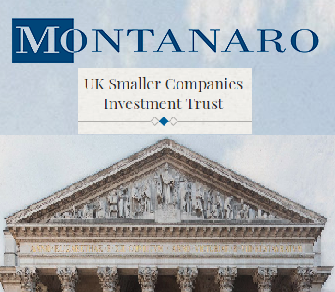Montanaro UK Smaller Companies Investment Trust (MTU) announced its annual results for the year ended 31 March 2023. The NAV total return and share price were both down 12%. In comparison, the Numis Smaller Companies (excluding investment companies) Index was minus 7.9%.
The company noted that the negative performance of UK SmallCap as an asset class can be attributed to the combined effect of rising interest rates coupled with investor concerns over a possible recession in the UK. According to the Investment Association, investors redeemed a record £1.3 billion from open-ended UK SmallCap funds in the 12 months to 31 March 2023. In addition to this, MUT suffered from its exclusive focus on quality and growth companies, which as a whole underperformed. Despite the poor absolute performance, the company did post the second strongest NAV and share price return of the peer group of eight investment trusts.
Regarding the outlook, manager, Charles Montanaro commented:
“The IMF is forecasting that interest rates will return to “rock bottom” due to chronic low growth in the developed world, linked to low productivity and ageing populations. Such forecasts are interesting insofar as they highlight just how unusual 2022 was. Interest rates soared as a result of the economic dislocation of COVID and the war in Ukraine, rather than underlying structural trends.
“Unusually, the quality and growth styles significantly lagged the market last year. As quality growth, SmallCap investors, it will always be challenging when quality, growth and smallCap all underperform – especially at such extreme levels. UK SmallCap posted its worst performance relative to LargeCap (21%) in 2022. It was MUT’s third worst year ever in terms of NAV performance, in a calendar year.
“However, it is unwise to become too down-hearted by one year. We have long argued that UK SmallCap is an attractive asset for long-term investors. It is important to give companies time to grow over time and different cycles. Taking a longer perspective, since January 1955, UK SmallCap has outperformed in 78% of the 70 ten-year rolling periods since then and in 99% of the 30-year rolling periods.
“As time ticks by, the impact of the black swan events described above appears to be fading. Global inflation has largely stabilised and investors are now pricing in the first interest rate cut as early as September 2023 in the US and March 2024 in the UK. The headwinds of the past 18 months might soon turn into tailwinds. However, we claim no expertise in forecasting macro-economic developments and waste little time in trying to do so.
“Instead, we talk to our companies. We continue to be reassured by their performance. Many (not all) have posted good numbers in the latest reporting season, giving us the confidence that in our quest for good companies with outstanding management, we have identified those that are not only growing, but are doing so from a position of strength. History has shown us that it pays to invest in and back high quality companies with good pricing power, strong competitive positions in markets with high barriers to entry, robust balance sheets and highly motivated, entrepreneurial management with exemplary standards of corporate governance.
“Although SmallCap remains out of favour as we write these lines, we cannot help but feel increasingly positive about what it holds in store for the coming years. At 31 March 2023, the Numis Smaller Companies (ex-IC) index was trading on 9.8x 12 months-forward earnings, 22% below its long-term average.
“To put things into perspective, since 2006 the index has only traded on a P/E of below 10x in 23 of the 198 months, i.e. 11% of the time. Every single time this has happened, it was followed by a year where SmallCap outperformed significantly (averaging a remarkable 23%).
“More importantly, as someone brought up to recognise that you cannot eat relative performance, when UK SmallCap has fallen then the following three years have seen strong absolute returns. Last year saw the sixth worst year of absolute returns. It is hard to recall such indifference to the asset class. As someone with more grey hair than most who has lived through seven bear markets, it is hard not to be excited about investment opportunities especially for long-term investors. To borrow the words of Andrew Jones, the highly regarded Chief Executive of LondonMetric Property PLC: “when you invest in quality, time will help you to create wealth.
“Since UK SmallCap appears to be cheap, you would expect take-over activity to pick up. Already there are signs that M&A activity is indeed rearing its head again (two of our holdings – Ideagen and Dechra – received bids in the past year).
“As investors in Dechra since their float in January 2000, we consider the chief executive Ian Page to be one of the very best managers we have had the good fortune to meet. We hope that we do not have to part company. So, private equity seems to share our view that the pickings are as attractive as they have been for several years.
“I am sorry, as a fellow shareholder, that MUSCIT has just suffered not only the worst three-year underperformance since launch in 1995 but also a decline in value. This is unprecedented. However, for those willing to close their ears to the noise and to ignore the doomsters at the Bank of England, opportunities abound.
“Since its launch in March 1995, MUSCIT has delivered an annualised NAV total return of 8.2%, which represents an outperformance of 1.6% p.a. compared to the benchmark.”
MTU : Patience is the key for Montanaro UK Smaller Companies
